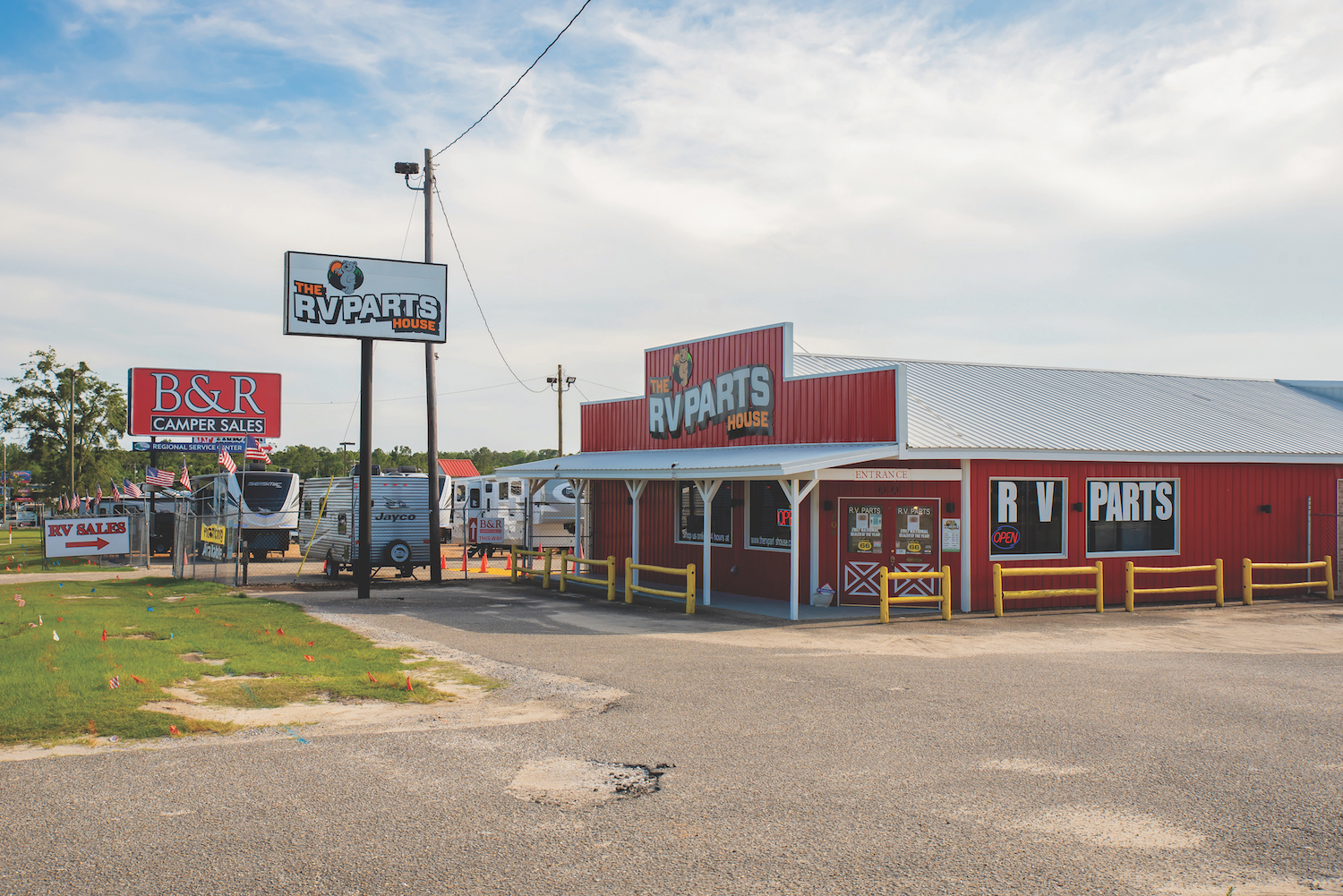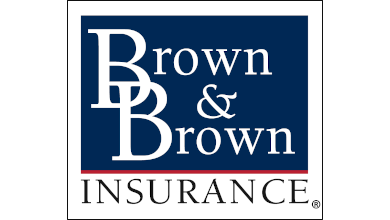Bootcamp for Business
Military experience – particularly lessons gleaned from the U.S. Army’s Officer Candidate School – have paid big dividends for the owner of B&R Camper Sales.
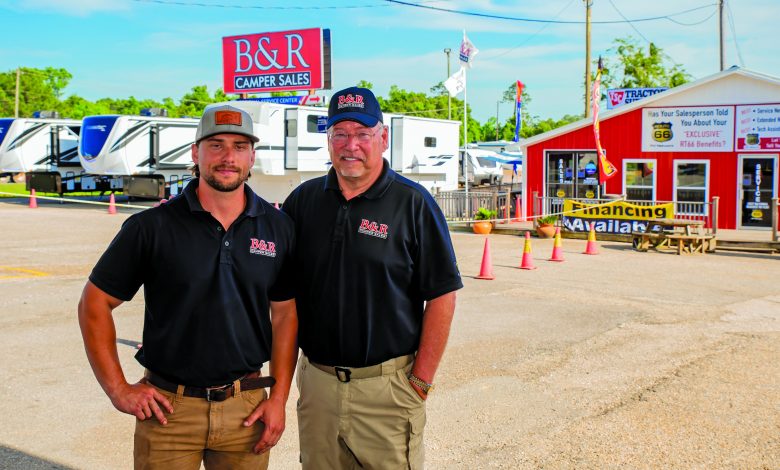
Despite being a fixture on the Gulf Coast for half a century, Jeff Fisher’s dealership outside of Mobile, Ala., simply wasn’t in a good place in 2017.
“If you looked at us four years ago, the future looked really uncertain. If you look at us today, you’d say, ‘Oh my God!’ There’s just been a heck of a transformation,” he says. “A lot of it has been good, solid business planning (and) leadership.”
Fisher says he believe the business is in a better position today than it’s ever been since he took over from his father and store co-founder, Bill Fisher, who passed away in 1999. It’s no mystery to Fisher what accounts for that change.
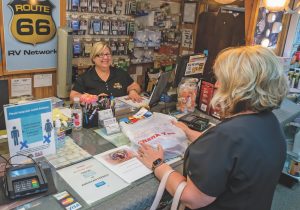
“The Army’s got a motto called: ‘Can Do.’ If you have a ‘Can Do’ attitude, good things will eventually happen to you,” says the retired U.S. Army lieutenant colonel, who is co-owner of B&R Camper Sales and the RV Parts House.
“Like everything else, if you stick to doing what you know how to do, the business starts to slowly return,” he adds. “We didn’t do anything stupid; we didn’t invest in things that didn’t have an immediate return – and by 2017, a lot of good things started happening to us.”
That’s the year B&R Camper won the Route 66 RV Network’s Larry Coker Commitment Award, a prestigious honor reserved for only one dealership annually out of Route 66’s 100-plus dealer network. Since then, Fisher has seen his internet parts business finally take root and prosper.
“Had I not gone into the military,” Fisher says, “I wouldn’t have the discipline to be where I’m at today. There’s a lot that I owe to the military.”
OCS Offers Lessons in Leaderships
In particular, Fisher believes the U.S. Army’s Infantry Officer Candidate School (OCS), a legendary institution created in 1941, provided him with all the tools he needed to run an effective business.
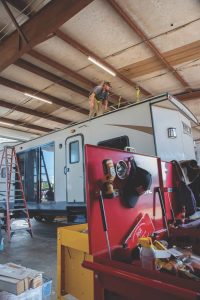
“I was enlisted for four years and (was) a sergeant at one point. But when I left active duty, I used my Montgomery G.I. Bill to get my four-year degree. I turned around and went back to Officer Candidate School,” he says. “You can’t be an officer in the military if you don’t have a four-year degree. For me, it was a long struggle because I had to go back and start the school process over to get a degree so I could go to OCS, so I could get a commission.”
Completing OCS meant learning some hard lessons when it comes to leadership, according to Fisher.
“Officers aren’t real popular … because you have to make a tough call every now and then. It’s not a popularity contest. You’re there to do a job,” he says.
“Business is not a popularity contest, either. Sometimes, you have to make the tough call, and sometimes you have to cut people loose because of downturns in business or you have to let people go because of disciplinary issues,” he adds. “You can’t always tell people what they want to hear, because if you do, you’re not going to be here for very long. At the same time, you have to set the standard – you have to be the example.”
Fisher remembers one OCS lesson vividly: Inspect – not expect.
“Even at the dealership, it holds true,” he says. “Everything we do, we have a two-step inspection process. I expect them to do good work, but then I inspect it to know they did it. That’s why, in service and sales, there’s at least two sets of eyes that check everything, and they have to sign off and put their name on it. If you don’t, things will get out of here that you’re not going to be proud of.”
Given all of the safety issues – and liability issues – of not installing a hitch correctly, or not having an LP gas line checked properly, or not addressing an electrical issue, a two-step inspection process must be a part of the service operation, he adds.
Uniforms Set the Tone at Work
Another Army principle that Fisher has found useful in the civilian world is appearance standards.
“In the military, you wear a uniform. It’s not because Uncle Sam wants you to look alike – it’s because Uncle Sam wants you to keep your appearance up, because it’s a form of discipline,” says Fisher. “It’s the same thing here. We provide all of our service technicians with uniforms.”
The reason is simple, he says, explaining, “I do not want customers coming in and saying, ‘Wow, they’re great people, but the guy who waited on me was wearing a T-shirt that had something offensive something on it,’” he says. “We’re in a professional setting and I demand professionalism from these people and nothing else is accepted.”
As a commanding officer in a combat support unit, Fisher also picked up the vital skill of planning, which he has applied to B&R Camper.
“I took this business and I said, ‘What do we do well and what do we not do well?’ I divided this business into four categories: sales, service, parts, rentals – which is what every dealer should do,” he says.
“I held each segment of this business equally accountable for putting in their percentage of revenue to cover the monthly expenses of this dealership. In sales, we do sales nationwide because we advertise nationwide. In parts, we advertise nationwide because we have a huge internet presence, plus we’ve got a very nice, very well-stocked and staffed brick- and-mortar store.”
Service has an especially important role. Not only does B&R take care of its own customers, it’s also a Forest River regional service center. Fisher presented the idea of a factory-level service center to the manufacturer in 2007. Forest River was so impressed it later created four additional centers across the country.
B&R Camper also has a strong rentals business, providing temporary housing in about 18 states. He estimates that the parts department contributes 30 to 35 percent of his average annual revenue for the dealership, while the service department accounts for 28 to 30 percent.
The remaining balance, according to Fisher, is a 60-40 split between temporary housing and new net sales.
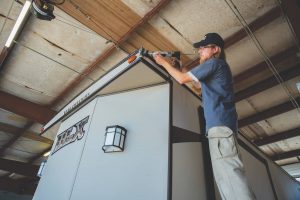
Taking a Balanced Approach
“We’re not reliant on any one department,” Fisher says of his business units. “At a lot of dealerships, if sales fall off, they’ve got nothing to fall back on. With us, I only need two of the four parts of this company making money for me to stay afloat. If I’m doing well in parts, which is brick-and-mortar and internet, or I’m doing well in conjunction with one other department, I just need two of the four departments to be doing well and they can carry the other two.”
It’s a simple business model, he insists, but it takes discipline like he learned growing up in a family, as well as the Army, to run the equivalent of four businesses at the same time.
Another part of OCS that Fisher has taken to heart concerns acceptable loss. There’s even a mathematical formula, he says, that commanders use to determine how many casualties an operation might involve and whether that’s an acceptable number.
“You want to use the least amount of force that you have to expend to have the most effect and make sure you protect your people,” he says. “Your people are an asset just like equipment. Your people are where it starts.
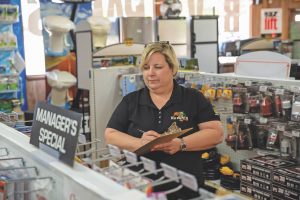
“The RV industry is the same way,” Fisher adds. “You do everything you can to protect your people and you do everything you can to keep good people to work for you. If your people understand what’s expected of the and there’s a standard that’s set and says, ‘Here’s the way we do things every single time,’ then we get better and go about our job.”
That’s more important than ever because the competition between dealers is fiercer now than ever, according to Fisher.
“There’s a lot of places to buy RVs and get RVs fixed. My local area is saturated with dealers and we’ve got some damn good ones around here,” he says. “There are some dealers around me that I highly respect. It’s called competition for a reason. They keep me honest because the fact that I know my customer can go down the street makes me work harder.”
Fisher’s military background also includes an education in logistics.
“It’s not ‘What do I need today?’ It’s ‘What do I need tomorrow? What do I need next week? Where do I need to be,’” he says. “Have a complete thought process to where you look at your different courses of action and you say, ‘Here’s what I think is going to happen – here’s where I need to be to position myself and position this business so that I don’t have the retail roller coaster, or so that I minimize the threat to my business.’”
The other part of logistics relates to what Fisher refers to as situational awareness.
“To me, situational awareness means you’re paying attention to your surroundings,” he says. “Your people are looking to you to give them the guidance and the information that they need so they can make decisions. If you don’t know what’s going on, they’re not going to know what’s going on. So, now you’d suddenly got a real problem and that’s when the ship runs aground.”
Not Everything Translates
Yet Fisher, who co-owns the dealership with his wife, Ellene, understands that not every facet of the military translates well to business.

“The Army is basically hard-charging, get-it-done, don’t care how you do it,” he says. “From my management team to every single employee, they’re all very, very valuable. But I’ll be perfectly honest, it starts with my wife. My wife is a highly degreed individual. She came from corporate America, which is a whole different style of education. She’s kind of the counterbalance to me.
“I see somebody who gets a little left of center and the Army comes out of me pretty quick. A lot of times, she grabs me by the collar and says, ‘If you do that, here’s what’s going to happen. This (running a dealership) ain’t the Army. You need to remember that.’” In addition to Ellene Fisher, who counts several Fortune 50 companies on her resume, the dealership also depends on Hayden Qualls, one of the couple’s two daughters and also a college graduate with a degree in human resources. After a four-year stint working in the RV Parts House – a business that annually sells more than $1 million in parts online alone – Qualls has moved into managing B&R’s fixed operations. Fisher’s brothers, Ted and Tracy, also work for the dealership.
So does Fisher’s son, Jonathan, a former U.S. Marine, who joined B&R in the role of service operations manager.
“He said, ‘Dad, I’ll be glad to come to work there, but I want you to remember one thing: I was a Marine; you were in the Army. I don’t take orders from the Army.’
“I said, ‘Alright, I get that, but you’ll take orders from your dad.’
He said, ‘That, I’ll do,’” according to the elder Fisher.
With such a solid staff that includes veteran managers Deb Rea over parts and accessories and Mike Williams over sales in place, Fisher says he is well-prepared to reach his next four-year goal: co-locating a satellite parts store – and even perhaps a service bay or two – on or nearby an independently owned campground.
The service business plays an especially important role at B&R Camper. Not only does the dealership take care of its own customers, it’s also a Forest River factory-level regional service center.
“When you start looking at it, you say, ‘OK, well, why not? Nobody’s doing it,’” Jeff Fisher says. “Everybody thought I was crazy when I invested a half-million dollars in a parts and accessories store – but if they could take a look at my books they wouldn’t think I’m crazy.”
